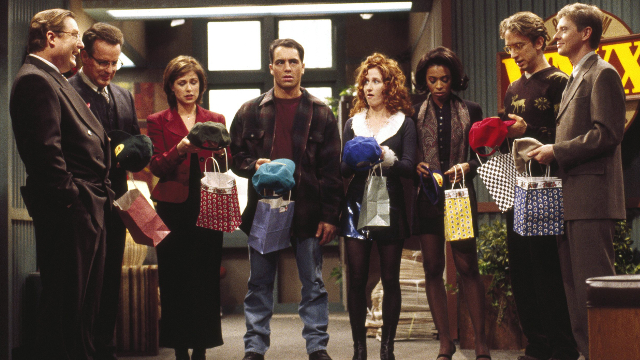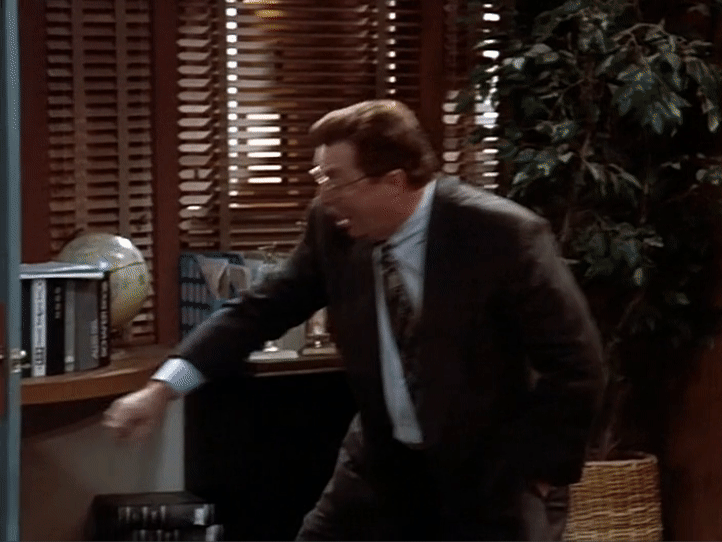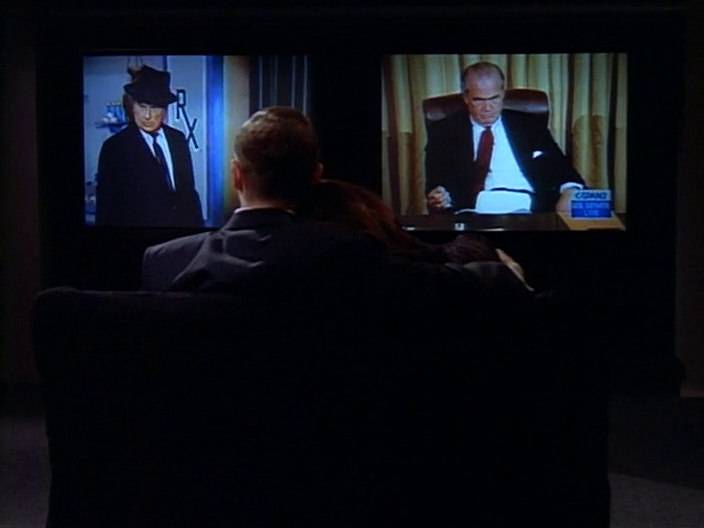A lot has been written about this show already, some of it by people who have said more and better than I can. By that I mostly mean Donna Bowman’s old AV Club reviews and the thorough breakdown of the show at “NewsRadio and the Comedic Art” (although the latter has sadly gone inactive; it’s been archived by the Wayback Machine, but some of the links and images may be broken). In fact, you could probably just read those and get a better picture of the show than I would be able to give you.
With that in mind, I’ll try to keep this simple and include some of the personal. But let’s run down the basics first, in case you’ve somehow missed them:
Created by Paul Simms (currently running What We Do in the Shadows), NewsRadio was a multi-camera sitcom that ran from 1995-1999, focusing on the inner workings of New York City radio station WNYX, and in particular, the eight characters who made up the main cast:
- New news director Dave Nelson (Dave Foley), fresh to the Big Apple from Wisconsin;
- Ambitious, high-strung perfectionist reporter and producer Lisa Miller (Maura Tierney);
- Clumsy, inept, and increasingly detached from reality “reporter” Matthew Brock (Andy Dick);
- Joe Garrelli (Joe Rogan), the conspiracy-minded handyman who never met a problem he couldn’t fix with one of his homemade solutions;
- Beth (Vicki Lewis), the energetic, hip, underpaid secretary;
- The station’s self-made billionaire owner / goofball eccentric (and great example of “eccentric” just meaning “weird and rich”), Jimmy James (Stephen Root);
- On air anchors Bill McNeal (or McNeil, the scripts never specified and often alternated spellings), played by Phil Hartman with all of his grandiose pomposity and the emotional remove that masked a deep pain and a horrific upbringing…
- …and the regal, dignified, no-nonsense Catherine Duke (Khandi Alexander).
NewsRadio, the little sitcom that could, premiered on NBC March 21, 1995. My father had moved out of the house just two months prior. I was finishing up my eighth-grade year; my brother was off in college, my older sister and her baby had moved back home, and being the only male in the house, I ended up bearing the brunt of the anger toward men that a woman going through a divorce and a single mother carried (while also having no real role models of my own to look up to as I entered puberty and started trying to figure out what being a man meant and what kind of man I wanted to be). I needed my own private retreat from it all, and while getting the internet around the same time that my dad left helped a lot, NewsRadio was also one of my biggest TV escapes from it all.
NBC didn’t know what they had, moving the show around constantly (the show changed time slots eleven times during its run), never letting it find an audience, and generally treating it with disdain. (Granted, the writers often deliberately thumbed their nose at the network, torpedoing their desires for a will-they-won’t-they with Dave and Lisa by having them sleep together in the second episode; technically satisfying the network’s desire for a “four weddings and a funeral” block by having a funeral for a rat; and, of course, there’s the infamous interview Paul Simms gave Rolling Stone, the basis for season-three episode “Mistake.”)
Looking back, in some ways, perhaps I felt like NewsRadio was me: Brilliant, unappreciated, and trapped somewhere it couldn’t thrive. (And much like Wilco during the same time period, it felt like my own personal secret.)
But it’s more likely I just liked it because it was really fucking funny.
I consider NewsRadio the apex of the multi-cam sitcom. (Perhaps for that reason, post-NewsRadio most of the brilliant and groundbreaking sitcoms we have seen have been single-camera, kicking off most notably with Arrested Development.) What really made it such wasn’t just the brilliant writing or the perfect ensemble cast; it was the timing and the staging of the jokes– few shows knew how to use the camera placement and the framing of shots to heighten and accentuate the jokes the way NewsRadio did. One excellent example is this scene from season 2’s “Physical Graffiti,” with Maura Tierney and Phil Hartman; Lisa walking out and then back into frame, along with Bill’s perfect lack of reaction to her attire, makes the joke so much better than if he’d overplayed it or the camera followed her.
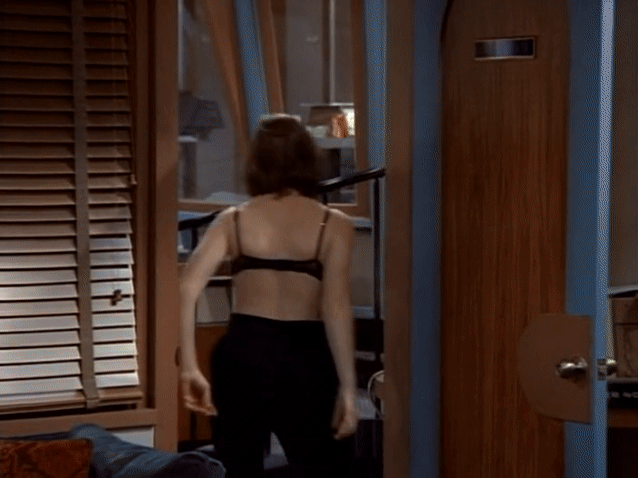
“You were thinking it!”
“Fair enough.”
And Andy Dick, the subject / performer of so many pratfalls, often had those pratfalls heightened by the way they were staged and framed. For example, in “Daydream,” after Matthew tells Dave and Jimmy he’s beating the heat by putting his shoes in the freezer, Dave takes the opportunity to send him sliding on his frozen shoes:
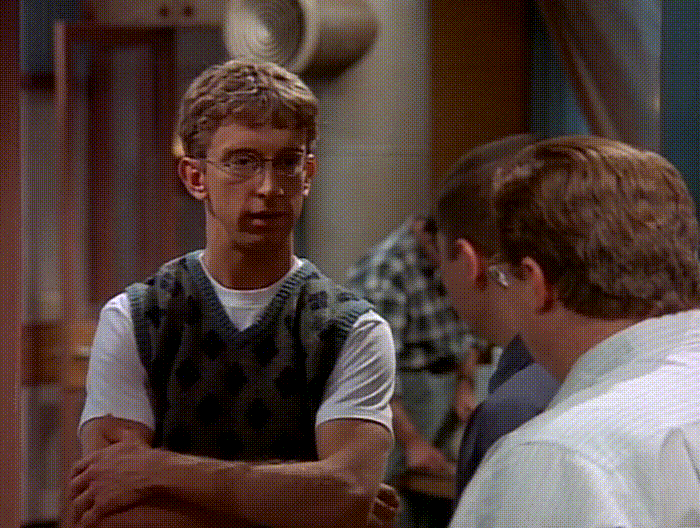
In the season 4 arc where Andrea the efficiency expert* has fired Matthew, he won’t stop hanging around the office in “The Public Domain,” and at one point Dave has Joe physically chase him out.
(* – Lauren Graham pre-Gilmore Girls; she fit very well into the show, but unfortunately, her presence was the impetus for Khandi Alexander leaving, as her existing frustration with Catherine’s lack of storylines was only exacerbated by the show bringing in a new woman character.)
The framing of the shot, along with Rogan’s physical fitness, make the gag much funnier, as Joe is just a terrifying blur on Matthew’s tail.
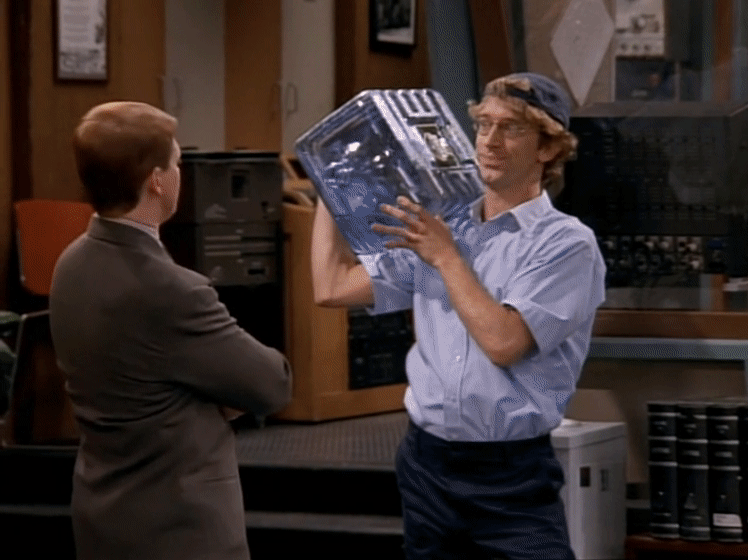
The long shot of Matthew and Bill’s confrontation in “Led Zeppelin Boxed Set,” after Lisa has convinced Bill to apologize to Matthew for making him cry, and Dave has convinced Matthew to stand up for himself, emphasizes the long divide they have to cross to make amends, which makes the shock of what actually happens that much funnier, as well as giving both Dick and Hartman the opportunity for full-body performances that make the scene much funnier than close-ups would.
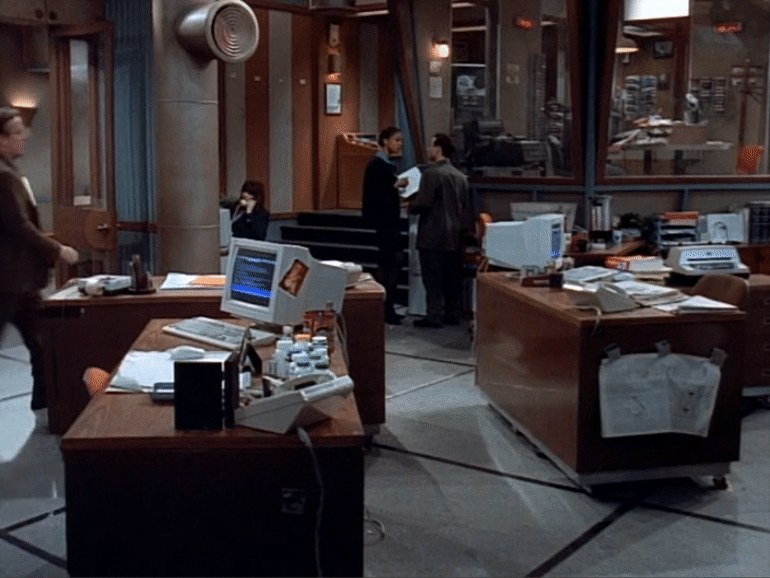
These are but a few examples of the brilliance of NewsRadio‘s staging and framing. For a great example of the editing, I have to throw in a reference to “Complaint Box,” likely the show’s finest (half-)hour, here– where Jimmy is on a fishing trip but stays in touch with the office thanks to the “Garrelli 1000”– because I don’t think I’ve ever seen a show cut to a reaction shot from an oscilloscope before or since, never mind making it so funny.
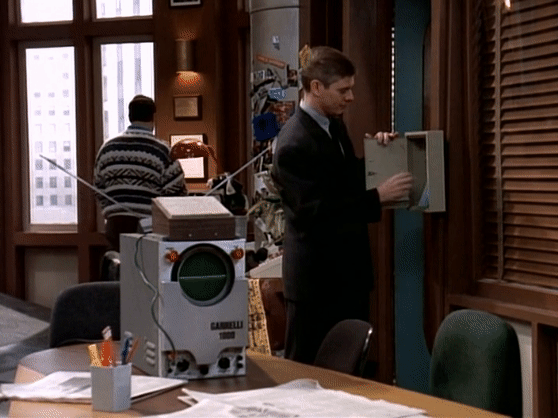
“BUM BUM BUMMMM!”
As far as the rest… what can I say that hasn’t been said? The show is eminently quotable, whether it’s Bill’s insane lines, family stories, and mis-rememberings of history (“Benedict Arnold slept with George Washington”); Jimmy’s often equally-insane blunt businessman-speak (“I got so many lawyers lined up to see me you’d think I had tobacco leaking out of my breast implants”); an observation from another character that also happens to sum up the ethos of the show (“Dave, you never want to do any cunning plans or crazy capers!”); or the memetic turns of phrase the show coined, like “bitchcakes” and “Super Karate Monkey Death Car.” The plotting could run from standard news-station fare, like covering a story or dealing with low ratings, to personal and office hijinks– Dave and Lisa’s on-again off-again relationship, Jimmy’s April Fools pranks, Dave’s horrific magazine interview where he trashes all of his co-workers– to Jimmy’s ridiculous flights of fancy, like running for president, traveling across the world in a hot-air balloon, or, of course, having his memoirs translated back into English from Japanese after they’re a hit in Japan, with predictable results. But no matter where they rated on the scale of grounded to absurd, the stories were consistently well-structured and provided ample opportunities for comedy.
And the performances are top-notch, the four most central characters in particular: Dave’s ability to be the straight man, getting across so much with a simple reaction shot, or the way he needles his employees to amuse himself. Bill’s Phil Hartman bombast and the walls he would only occasionally let down. Jimmy as not only the fun-loving trickster billionaire, but also Stephen Root’s ability to shift his performance on a dime: like when Jimmy becomes a wooden, awful actor as the subject of a documentary, or (one of my favorite acting moments of all time) when Dave gives him seven bucks in “Station Sale” to admit the station and its people really mean something to him… and he does, then immediately flips the switch back into pure businessman mode, without ever letting even a drop of insincerity through either.
Maura Tierney’s performance as Lisa may be the most underrated, with her often understated expressiveness and physicality. Another favorite subtle moment of mine is in “Rap,” when Jimmy is going on his advertising rant– which, aside, is deliriously funny; Stephen Root is a master of keeping Jimmy articulate even when he’s in a rage– and he gets to “THERE’D BE NO SNUFFLEUPAGUS, WOULD THERE?!” and starts waving Lisa’s arm around like a trunk. It’s a simple, subtle thing, but Tierney lets her arm go perfectly limp in way that makes the moment go beyond funny and into genius. This is also a great three-second example of her expressiveness, as her face manages to communicate being perplexed with Jimmy while her eyes are pleading with Dave to get her out of this.
But let’s not sell the rest of the characters short. Matthew’s physical goofiness and Dick’s ability to portray him as a man who knew he was ridiculous but still had pride and dignity. Joe embodying a different kind of physicality and credibly selling himself as someone who was smarter than he looked but perhaps still not quite as smart as he thought.
(Even though Rogan was by far the least experienced actor in the cast, having come to Hollywood through standup, he was still just right for the role– and one of a couple of recastings after the pilot. The handyman in the pilot– originally cast with Ray Romano, until he was fired for not meshing with the show’s style– was named Rick and played by Greg Lee, and Catherine was played by Ella Joyce.)
That physicality, and Joe’s relationship with Matthew, are key to another scene in “The Public Domain,” when Joe has to physically carry Matthew out of the office while Dave distracts Andrea and her hired gun Steve. It plays out silently in the background, with their heads– Joe’s shaking and Matthew’s hanging– communicating everything we need to know:
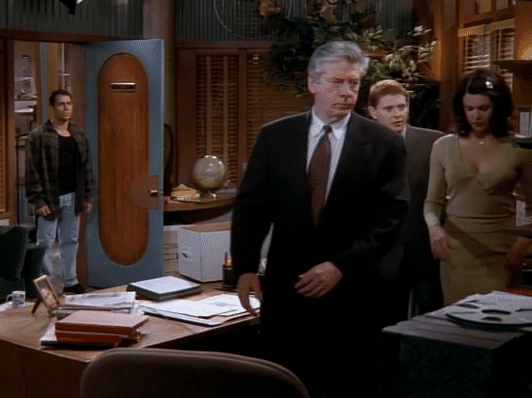
“Uh, there’s something stuck behind my door. Would you mind taking care of that, Joe?”
(The scene even continues into the credits– something that increasingly happened in the fourth season– as Joe deposits Matthew in a garbage can outside the building, and Matthew struggles to get out.)
Then there’s Beth as the heart of the show, and how Vicki Lewis’ vulnerable-spitfire performance could pull the office together in tough times or find delight in the goings-on in better ones, particularly when she could manipulate Dave and/or Lisa. Her plea and desperate last-ditch offer to Jimmy to keep the station underline Beth’s vulnerability and status as the heart of the office. Beth explaining the differences between the different adjectives to describe women to Lisa in “Rap”– and the repetition of the exact behavior– showcases how instantly Lewis could light that spark:
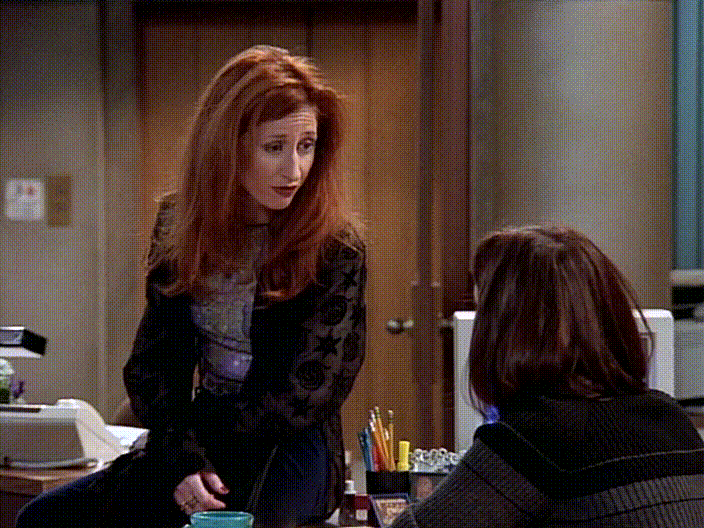
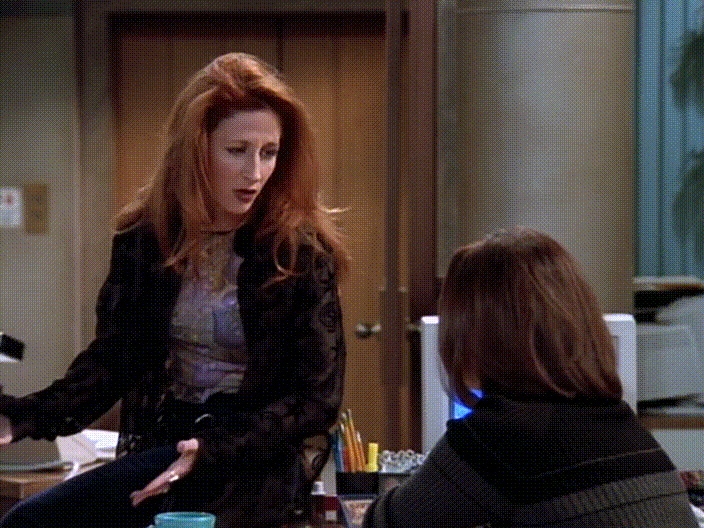
And then there’s Catherine’s ability to keep her head above water and her regal bearing despite the craziness around her, and the times when that was pushed or challenged. And all the times she slapped the men in the office, mostly Joe, as memorialized by the credits sequence for her final episode, “Catherine Moves On”:
It’s an ensemble cast that fit their roles perfectly and fit together with each other perfectly, in a way few shows have approached.
I haven’t really revisited the fifth season.
I was up late on the internet one night in May after my school year had ended, chatting on IRC with people with like-minded interests– the internet being the one place I could find people who shared them without risking my anonymity or risking the mockery that came with sharing parts of myself that I had come to see as typical for my upbringing and surroundings. Near sunrise, a shocking rumor started to come into the channel, and then further details: Phil Hartman was dead; his wife had shot him and then herself.
That was the first time I’d ever really grieved a celebrity death. I didn’t know the man, but NewsRadio had become so personal to me, and I related to Bill and his horrific tales of his upbringing so much. And now my weird TV uncle who used a placid smile and dark humor to cover the pain inside, much like I did, was dead.
I don’t know if I could revisit the feelings that brought out of me. I don’t think I’ve watched “Bill Moves On” since it first aired.
I also just don’t think the fifth season is as good. The show survived without Catherine, although her ability to put Bill in his place was sorely missed. But Bill was essential to the comedy and the cast chemistry in a way only a few people were. I agree with the “NewsRadio and the Comedic Art” essay that the four “pillars” of the show, the core characters essential to the comic dynamic, were Dave, Lisa, Bill, and Jimmy.
(I’ve also found that this “pillars” and “walls” dynamic can be applied to quite a few other shows, and it’s often defined by the lead character / straight man and their relationships to him. Here, it’s Dave as the straight man, and the other pillars are his romantic interest / professional rival, the employee who’s a thorn in his side, and his boss. In The Office, it’s Jim, Pam, Dwight, and Michael– the straight man, his romantic interest, his professional rival / thorn in his side, and his boss. Arrested Development had a big ensemble cast and the relationships were familial rather than professional, but I have argued for a long time that the core characters reflect the straight man and his roles in the family. That is to say, they’re Michael, Lucille, GOB, and George Michael: Michael himself, Michael as son, Michael as brother, Michael as father.)
After two previous guest appearances as different characters, Jon Lovitz was brought in to play Max Louis as Bill’s replacement anchor– a role he considered very personal as he and Hartman had been close friends going back to their time together in the Groundlings and through Saturday Night Live. God love him for trying, but he just couldn’t bring Phil Hartman’s energy or recapture the same dynamic– I mean, who could? You get Jon Lovitz to play a Jon Lovitz character; you get Phil Hartman to play a Phil Hartman character. And no one could replace Phil Hartman.
I also thought the show did Lisa a disservice with her storyline with Johnny Johnson– a fine character in his own right, but making Lisa fall for him and marry him felt far too impulsive for such a neurotic and meticulous planner. It also rarely works out in TV storytelling, I think, when a will-they-won’t-they takes Option C (even if Dave and Lisa were too alike and too competitive with each other to have ultimately ended up together).
But even if that season didn’t live up to the standards set before, we still have the nearly-perfect third season, a nearly as good second season, and a first and fourth seasons that, even though they weren’t quite always what the show was capable of, still had some very good, even great episodes (“The Public Domain,” for example) and hilarious moments.
More than twenty-five years after Phil Hartman’s death, NewsRadio still feels as fresh and sharp as it ever did. (Other than the admittedly-necessary, given it’s about a news radio station, references to 90s politics and news topics.) It’s got wit and physical comedy, bombast and subtlety, humor and heart. It’s my favorite live-action sitcom of all time, and the personal reasons for that won’t apply to you, but the craft in the writing and performances and direction is still so perfect, that if you’ve somehow missed it all this time, I can’t imagine a better treat than getting the opportunity to discover it.
(NewsRadio is currently streaming for free on The Roku Channel (for now) and Pluto TV, and is available for purchase on several other streaming websites. DVDs are also available both of the complete series and by season.)

